Introduction
What CAPNAT 500MG is used for?
- CAPNAT 500MG is used in the treatment of colon, rectal, gastric or breast cancer
- It is used to prevent new occurrence of colon cancer after complete removal of the tumor by surgery
Warning & Precautions
Talk to Doctor
Talk to your doctor before you take this medicine, if you:
- Are allergic to Capecitabine or any of the other ingredients of this medicine
- Have severely low levels of white cells or platelets in the blood (leucopenia, neutropenia or thrombocytopenia)
- Have severe liver or kidney or heart problems
- Have brain diseases (for example cancer that has spread to the brain) or nerve damage (neuropathy)
- Have calcium imbalance
- Have diabetes
- Have diarrhoea
- Have imbalance of ions in your blood
- Have a history of eye problems
Pregnancy & Breast Feeding
- If you are pregnant or breast-feeding, think you may be pregnant or are planning to have a baby, ask your doctor for advice before taking this medicine
- You must not take CAPNAT 500MG if you are pregnant or breast-feeding
- You must not breast-feed if you are taking CAPNAT 500MG
Children & Adolescents
- CAPNAT 500MG is not for use in children and adolescents
Driving & Using Machines
- Do not drive or operate machines if you feel dizzy, nauseous or tired after taking this medicine
Interactions
Tell your doctor if you are taking,
- Allopurinol used to treat gout
- Coumarin, warfarin used as blood-thinning medicines
- Sorivudine and brivudine used for viral infection
- Phenytoin used for seizures
- A medicine to treat cancer (interferon alpha)
- Radiotherapy and certain medicines used to treat cancer (folinic acid, oxaliplatin, bevacizumab, cisplatin, irinotecan)
- Folic acid or iron supplements
How to Use
- Always take this medicine exactly as your doctor has told you
- Take the tablets within 30 minutes after the end of a meal (breakfast and dinner) and swallow them whole with water
- CAPNAT 500MG is usually taken for 14 days followed by a 7 day rest period (when no tablets are taken). This 21-day period is one treatment cycle
If you take more CAPNAT 500MG
- If you take more CAPNAT 500MG, contact your doctor as soon as possible before taking the next dose
- You might get the following side effects if overdosed feeling or being sick, diarrhoea, inflammation or ulceration of the gut or mouth, pain or bleeding from the intestine or stomach or bone marrow depression (reduction in certain kinds of blood cells)
If you forget to take CAPNAT 500MG
- Do not take the missed dose at all
- Do not take a double dose to make up for a forgotten dose
- Instead, continue your regular dosing schedule and check with your doctor
If you stop taking CAPNAT 500MG
- Do not stop taking this medicine without consulting your doctor
Side Effects
Like all medicines, this medicine can cause side effects, although not everybody gets them
Serious
- Diarrhoea
- Vomiting, nausea
- Pain, redness, swelling or sores in your mouth
- Swelling, redness or tingling of hands and/or feet
- Fever
- Infection
- Pain localized to the centre of the chest, especially if it occurs during exercise
- Painful red or purplish rash that spreads and blisters and/or other lesions begin to appear in the mucous membrane (e.g. mouth and lips), in particular if you had before light sensitivity, infections of the respiratory system (e.g. bronchitis) and/or fever
Common
- Decreases in the number of white blood cells or red blood cells (seen in tests)
- Dehydration, weight loss
- Sleeplessness (insomnia), depression
- Headache, sleepiness, dizziness, abnormal sensation in the skin (numbness or tingling sensation), taste changes
- Eye irritation, increased tears, eye redness (conjunctivitis)
- Shortness of breath, nose bleeds, cough, runny nose
- Cold sores or other herpes infections
- Infections of the lungs or respiratory tract system (e.g. pneumonia or bronchitis)
- Bleeding from the gut, constipation, pain in upper abdomen, indigestion, excess wind, dry mouth
- Skin rash, hair loss (alopecia), skin reddening, dry skin, itching (pruritus), skin discolouration, skin loss, skin inflammation, nail disorder
- Pain in the joints or in the limbs (extremities), chest or back
- Fever, swelling in the limbs
- Problems with liver function (seen in blood tests) and increased blood bilirubin (excreted by the liver)
- Decrease in blood sodium, magnesium or calcium, increase in blood sugar
- Nerve pain
- Ringing or buzzing in the ears (tinnitus), loss of hearing
- Vein inflammation
- Hiccups, change in voice
- Pain or altered/abnormal sensation in the mouth, pain in the jaw
- Sweating, night sweats
- Muscle spasm
- Difficulty in urination, blood or protein in the urine
- Bruising or reaction at the injection site (caused by medicines given by injection at the same time)
- Abdominal pain
- Tiredness
- Loss of appetite (anorexia)
Uncommon
- Blood infection, urinary tract infection, infection of the skin, infections in the nose and throat, fungal infections (including those of the mouth), influenza, gastroenteritis, tooth abscess, lumps under the skin (lipoma)
- Decreases in blood cells including platelets, thinning of blood (seen in tests)
- Allergy
- Diabetes, decrease in blood potassium, malnutrition, increased blood triglycerides
- Confusional state, panic attacks, depressed mood, decreased libido
- Difficulty speaking, impaired memory, loss of movement coordination, balance disorder, fainting, nerve damage (neuropathy) and problems with sensation
- Blurred or double vision
- Vertigo, ear pain
- Irregular heartbeat and palpitations (arrhythmias), chest pain and heart attack (infarction)
- Blood clots in the deep veins, high or low blood pressure, hot flushes, cold limbs (extremities), purple spots on the skin
- Blood clots in the veins in the lung (pulmonary embolism), collapsed lung, coughing up blood, asthma, shortness of breath on exertion
- Bowel obstruction, collection of fluid in the abdomen, inflammation of the small or large intestine, the stomach or the oesophagus, pain in the lower abdomen, abdominal discomfort, heartburn (reflux of food from the stomach), blood in the stool
- Skin ulcer and blister, reaction of the skin with sunlight, reddening of palms, swelling or pain of the face
- Joint swelling or stiffness, bone pain, muscle weakness or stiffness
- Increased frequency of urination during the night, incontinence, blood in the urine, increase in blood creatinine (sign of kidney dysfunction)
- Unusual bleeding from the vagina, swelling (oedema), chills
Rare
- Narrowing or blockage of tear duct (lacrimal duct stenosis)
- Inflammation leading to dysfunction or obstruction in bile secretion (cholestatic hepatitis)
- Specific changes in the electrocardiogram (QT prolongation)
- Certain types of arrhythmias (including ventricular fibrillation, torsade de pointes and bradycardia)
- Eye inflammation causing eye pain and possibly eyesight problems
- Inflammation of the skin causing red scaly patches due to an immune system illness
- Severe skin reaction such as skin rash, ulceration and blistering which may involve ulcers of the mouth, nose, genitalia, hands, feet and eyes (red and swollen eyes)
More Information
Storage
- Keep this medicine out of reach of children
- Do not use this medicine after the expiry date
- Store at room temperature (15-25°C)
FAQs
Q. What are the side effects of Capnat?
The side effects of Capnat include stomach pain or upset stomach, constipation, loss of appetite, and change in ability to taste food. It may also cause increased thirst, unusual tiredness or weakness, dizziness, headache, hair loss, skin rash, back, join, or muscle pain. You may also experience red, swollen, itchy, or teary eyes and trouble falling asleep or staying asleep. Inform your doctor if any of these symptoms are severe and persist for long.
Q. What are the serious side effects of Capnat?
The use of Capnat may cause various serious side effects such as diarrhea, nausea, vomiting, sores in the mouth, swelling, pain, redness, or peeling of skin on the palms and soles of the feet. One may also experience fever, chills, sore throat, or other signs of an infection, swelling of the hands, feet, ankles, or lower legs, chest pain or pressure, fast heartbeat, dark urine and yellowing of the skin or eyes. Inform your doctor immediately if you experience any such symptoms.
Q. Does Capnat make you tired?
Yes, Capnat may make you tired and you may also feel weak, as these are the most common side effects of the medicine. Hence, it is possible that use of Capnat may affect your ability to drive or operate machinery.
Q. What is the most important information that I should know about Capnat?
It is important to know that Capnat can interfere with working of blood thinners like warfarin. This type of interference can cause a change in the rate of clot formation and can cause bleeding that can even lead to death. The risk is higher for cancer patients, especially those who are over 60 years of age. Seek immediate medical help if you experience symptoms like unusual bleeding, vomiting or spitting up blood or brown material that resembles coffee grounds, bloody or black, tarry stools, blood in urine, red or dark-brown urine, or easy bruising.
Q. How long do I need to take Capnat?
The duration of treatment with Capnat depends on the nature of your illness and individual response to treatment. Usually, it is given as a series of treatment cycles, each of these cycles lasts for 21 days. Capnat is given for 14 days followed by a rest period of 7 days. You should continue taking this medicine for the time prescribed by the doctor.
Q. Do I need to use birth control method while using Capnat?
Yes, birth control methods are a must while using Capnat, as this medicine may harm your unborn child. Females should continue using these methods for 6 months after the final dose. On the other hand, men using these medicines whose partners can become pregnant should use effective birth control during treatment and for 3 months after the final dose.
Q. What kind of drug is Capnat?
Capnat is an anti-cancer (antineoplastic or cytotoxic) chemotherapy drug. Capnat is classified as an "antimetabolite." Capnat itself is not a cytostatic medicine; it gets converted into an active anti-cancer medicine (more in tumour tissue than in normal tissue) only after getting absorbed by the body.
Q. Do I need to get any tests done while on Capnat?
The doctor will check you on a regular basis while you are taking Capnat to monitor side effects and your response to therapy. You may need to get your blood test done as advised by the doctor to monitor your complete blood count (CBC) as well as the function of kidneys and liver.
Q. Should Capnat be taken with or without food?
Capecitabine should be taken within 30 minutes after finishing a meal. Swallow tablets as a whole (do not cut or crush) with water. Consult your doctor if you cannot take the whole tablet. If Capnat needs to be crushed or cut, it should be done by a trained professional using appropriate equipment and safety procedures.
 Disclaimer:
Disclaimer:The contents of this website are for informational purposes only and not intended to be a substitute for professional medical advice, diagnosis, or treatment. Please seek the advice of a physician or other qualified health provider with any questions you may have regarding a medical condition. Do not disregard professional medical advice or delay in seeking it because of something you have read on this website.

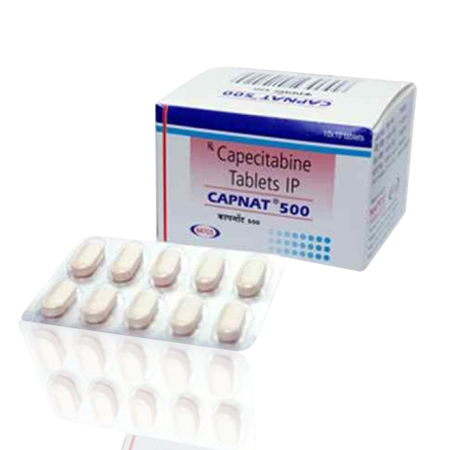
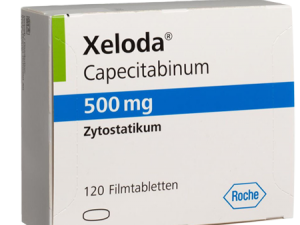
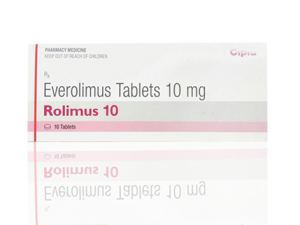
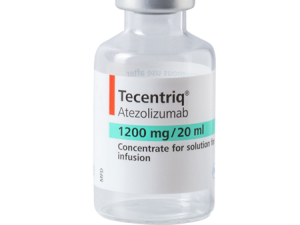
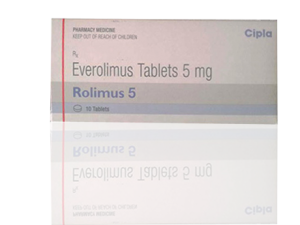
Reviews
There are no reviews yet.